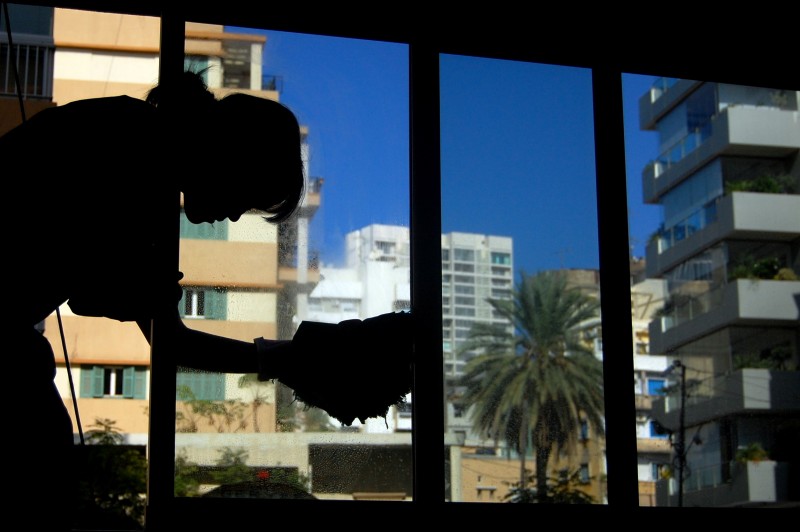
Female domestic migrant workers in Beirut, Lebanon, in February 2009. Photo by Sandra ten Zijthoff. Copyright Demotix.
Nine Lebanese civil society organizations have released a statement condemning the expulsion of children of migrant workers born in Lebanon.
In a press release, entitled “Migrant Workers’ Children Expelled: Directive Tearing Families Apart“, both local and international human rights NGOs have condemned the government's decision to deport locally born children of migrant workers and in some cases their mothers.
There are between 200,000 and 250,000 migrant workers in Lebanon working under the controversial Kafala, or ‘Sponsorship’, system. Under the Kafala system, any ‘unskilled laborer’ (domestic worker) has his or her legal status in the hands of an employer or ‘in-country sponsor’. “With the Kafala system,” International Labor Organization (ILO) senior Ms. Simel Esim was quoted as saying, “you are creating a total dependency of the worker on the employer for her food, sleeping, health, everything… total dependency creates total vulnerability and opens the door wide to exploitation.” Indeed, abuses such as this one are common on both societal and governmental levels.
The business side of the situation was highlighted by a recent report by Lebanon human rights NGO KAFA, whose name translates to Enough. The report details the lucrative recruitment business which often deceives migrant workers into coming to Lebanon. Indeed, as many as 88% of Nepalis and Bangladeshis interviewed reported that they would not have come to Lebanon “had they fully known the reality.”
The statement, signed by the Anti-Racism Movement (ARM), Lebanese Association for Education and Training (ALEF), Human Rights Watch MENA (HRW), Insan Association, Lebanese Center for Human Rights (CLDH), Legal Agenda, Migrant Community Center (MCC), Migrant Workers Task Force (MWTF) and The Association for Justice and Mercy (AJEM), condemn the decision as unjustified:
Under General Security’s new directive some families are being torn apart while others are apparently being denied their livelihoods simply because they’ve had children in Lebanon,” said a spokesperson for the organizations. “The Lebanese authorities have not given any justification for this new policy and should immediately revoke this directive as it interferes with the right to family life.
The decision seems to be directly targeted at low-wage migrant workers:
Since May 2014, nearly a dozen female migrant workers, many of them longstanding residents of Lebanon, reported to human rights groups that when they went to General Security to renew residency papers for themselves and their children, they were turned down. Some were told they were not allowed to have children in Lebanon and given a short period of time to leave the country. In some cases, they said, they were given as little as 48 hours.
[…] Sources within General Security have confirmed to nongovernmental groups that the agency has a new directive regarding the renewal of residency permits for Lebanon-born children of low-wage migrants and their migrant parents. Despite written requests from the nongovernmental groups to receive a copy of the directive the agency has yet to respond. Activists say the directive was apparently adopted in January 2014, but has been applied more stringently since May and has resulted in the expulsion of some family members of migrant workers.
Based on research by the organizations, all migrant workers interviewed who were affected by the decision so far appear to be women who are Category 3 and 4 workers under Lebanon’s labor regulations – low-paid workers in industries such as sanitation, agriculture, and domestic work. Although foreign workers in these categories are not allowed to sponsor the residency for their spouses or children, until recently, women in these categories could extend their residency permits to include children born in Lebanon.
If implemented, this policy will be in direct violation of several international human rights treaties which were signed by Lebanon, including the International Covenant on Civil and Political Rights (ICCPR), the Convention on the Elimination of All Forms of Racial Discrimination (CERD), and the Convention on the Rights of the Child (CRC), according to the statement.
The statement ends with a call for the Lebanese government to uphold its legal obligations:
The Lebanese government should comply with its international obligations by ensuring that General Security considers the family interests involved before rejecting the renewal of residency for workers or their children or considering their expulsion. The government should also ratify the International Convention on the Protection of the Rights of All Migrant Workers and Members of Their Families to safeguard the rights of migrants in Lebanon.






